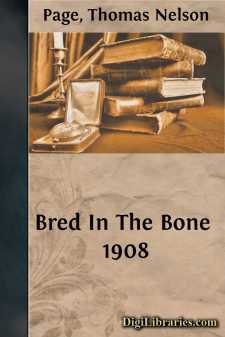Categories
- Antiques & Collectibles 13
- Architecture 36
- Art 48
- Bibles 22
- Biography & Autobiography 813
- Body, Mind & Spirit 142
- Business & Economics 28
- Children's Books 17
- Children's Fiction 14
- Computers 4
- Cooking 94
- Crafts & Hobbies 4
- Drama 346
- Education 46
- Family & Relationships 57
- Fiction 11829
- Games 19
- Gardening 17
- Health & Fitness 34
- History 1377
- House & Home 1
- Humor 147
- Juvenile Fiction 1873
- Juvenile Nonfiction 202
- Language Arts & Disciplines 88
- Law 16
- Literary Collections 686
- Literary Criticism 179
- Mathematics 13
- Medical 41
- Music 40
- Nature 179
- Non-Classifiable 1768
- Performing Arts 7
- Periodicals 1453
- Philosophy 64
- Photography 2
- Poetry 896
- Political Science 203
- Psychology 42
- Reference 154
- Religion 513
- Science 126
- Self-Help 84
- Social Science 81
- Sports & Recreation 34
- Study Aids 3
- Technology & Engineering 59
- Transportation 23
- Travel 463
- True Crime 29
Thomas Nelson Page
Thomas Nelson Page was an American lawyer, politician, and writer, known for his literary works that romanticized the Old South. Born in 1853 in Virginia, he gained fame through his short stories and novels, such as "Marse Chan" and "In Ole Virginia," which depicted the antebellum South with a nostalgic view of plantation life. Page also served as the U.S. ambassador to Italy from 1913 to 1919 under President Woodrow Wilson.
Author's Books:
Sort by:
THE COAST OF BOHEMIA There is a land not charted on all charts;Though many mariners have touched its coast,Who far adventuring in those distant parts,Meet ship-wreck there and are forever lost;Or if they e'er return, are soon once moreBorne far away by hunger for that magic shore. Its mystic mountains on the horizon piled,Some mariners have glimpsed when driven farOut of life's measured...
more...
CHAPTER I INTRODUCTORY Gordon Keith was the son of a gentleman. And this fact, like the cat the honest miller left to his youngest son, was his only patrimony. As in that case also, it stood to the possessor in the place of a good many other things. It helped him over many rough places. He carried it with him as a devoted Romanist wears a sacred scapulary next to the heart. His father, General McDowell...
more...
It was the afternoon before the closing day of the spring meeting of the old Jockey Club that so many people know. The next day was to be the greatest ever known on that course; the Spring Meeting was to go out in a blaze of glory. As to this everybody in sight this spring afternoon was agreed; and the motley crowd that a little before sunset stood clustered within the big white-painted gate of the...
more...
They had lived within a mile of each other for fifty-odd years, old Judge Hampden and old Colonel Drayton; that is, all their lives, for they had been born on adjoining plantations within a month of each other. But though they had thus lived and were accounted generally good men and good neighbors, to each other they had never been neighbors any more than the Lévite was neighbor to him who went down...
more...
Berryman Livingstone was a successful man, a very successful man, and as he sat in his cushioned chair in his inner private office (in the best office-building in the city) on a particularly snowy evening in December, he looked it every inch. It spoke in every line of his clean-cut, self-contained face, with its straight, thin nose, closely drawn mouth, strong chin and clear gray eyes; in every...
more...
MY COUSIN FANNY We do not keep Christmas now as we used to do in old Hanover. We have not time for it, and it does not seem like the same thing. Christmas, however, always brings up to me my cousin Fanny; I suppose because she always was so foolish about Christmas. My cousin Fanny was an old maid; indeed, to follow St. Paul's turn of phrase, she was an old maid of the old maids. No one who saw her...
more...
The county of H——— was an old Colonial county, and even as late as the time of my story contained many Colonial relics. Among them were the court-house and the jail, and, at that time, the Judge and the Sheriff. The court-house was an old brick edifice of solemn and grayish brown, with a portico whose mighty columns might have stood before a temple of Minerva overlooking the Ægean Sea. With its...
more...
I had not seen my friend Stokeman since we were at college together, and now naturally we fell to talking of old times. I remembered him as a hard-headed man without a particle of superstition, if such a thing be possible in a land where we are brought up on superstition, from the bottle. He was at that time full of life and of enjoyment of whatever it brought. I found now that his wild and almost...
more...
It was his greatest pride in life that he had been a soldier—a soldier of the empire. (He was known simply as "The Soldier," and it is probable that there was not a man or woman, and certain that there was not a child in the Quarter who did not know him: the tall, erect old Sergeant with his white, carefully waxed moustache, and his face seamed with two sabre cuts. One of these cuts, all...
more...
There do not seem to be as many hares now as there used to be when I was a boy. Then the "old fields" and branch-bottoms used to be full of them. They were peculiarly our game; I mean we used to consider that they belonged to us boys. They were rather scorned by the "gentlemen," by which was meant the grown-up gentlemen, who shot partridges over the pointers, and only picked up a hare...
more...











